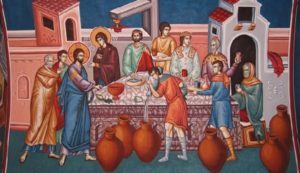The Importance of Wine, as recorded in the Holy Scriptures
26 May 2016We’ll start by quoting some selected passages from the Scriptures, in order to cover as many aspects of the vine and wine as we can.

Wine as a material good/Preservation of wine: The Wisdom of Sirach [Ecclesiasticus] says (39, 26): ‘The principal things for the whole use of people’s lives are water, fire iron and salt, flour of wheat, honey, milk and the blood of the grape, and oil and clothing’. Corn, wine and oil are considered to be essentials (Ps. 4, 8). Wine is important in life because it’s a tonic, especially for those walking long distances. Saint Paul tells Timothy: ‘Stop drinking only water, and use a little wine because of your stomach and your frequent illnesses’ (1 Tim. 5, 23). We also know that both Romans and Greeks were acquainted with the fact that vinegar in water is a thirst quencher, which is why, when Christ was on the cross, He was offered vinegar when He was thirsty, to help against dehydration and the dryness caused by thirst. One of the soldiers took a sponge, dipped it in vinegar, fixed it to a reed and tried to get Christ to drink some (Matth. 27, 48). Previously, before the Crucifixion, Christ had not drunk vinegar ‘mixed with gall’. Opinions differ as to what Saint Matthew meant. Two of these are: a) that the gall and wine, which is called vinegar by the other Evangelists, was relief against the pain for those about to be crucified; or b) the Christ didn’t drink the vinegar mixed with bitter wine (giving the taste of gall). In general, Jews considered products which had been altered to be ‘unclean’ or contaminated.
When Ziba, the servant of Mephibosheth, met King David, he had with him ‘a couple of donkeys saddled, bearing two hundred loaves of bread, a hundred bunches of raisins, a hundred of summer fruits, and a skin of wine. And the king said to Ziba, “Why have you brought these?” Ziba answered, “The donkeys are for the king’s household to ride on, the bread and summer fruit for the young men to eat, and the wine for those who faint in the wilderness to drink.”’ (II Kings 16, 2 [In the Septuagint; II Sam. 16, 2 in Western Bibles]).
The Israelites knew how to use both wine and vinegar in their food. Boaz fed Ruth bread dipped in vinegar. The people of Israel knew enough to keep wine in skins and, moreover, they were aware that old wine shouldn’t be mixed with new. Christ used this knowledge metaphorically when he told one of His parables (Matth. 9, 12-14; Mark 2,22; Luke 5, 37-9), saying that we don’t put new wine in old wineskins, because they would burst, the wine would spill and the skins would be ruined. You put new wine into new skins, and that way both survive. What He meant was that His teaching, which was the new wine, can’t be put into old skins (the Pharisees and their teachings), but should go into new skins (His disciples).
A saying in the Proverbs of Solomon declares that the Israelites knew that it was no use putting vinegar on open wounds: ‘As vinegar is bad for a sore, so trouble befalling the body afflicts the heart’ (25, 20). They also knew that unripe grapes are bad for the teeth: ‘The parents eat sour grapes, and the children’s teeth are set on edge’ (Ez. 18, 2). Meanwhile the book of Isaiah mentions the famous vineyards of the Moabites: ‘I weep, as Jazer weeps for the vines of Sibmah… no one sings or shouts in the vineyards; no one treads out wine at the presses, for I have put an end to the shouting’. They also knew about proper maintenance, since Christ, referring to His Father as the vine-grower, says: ‘He cuts off every branch in me that bears no fruit, while every branch that does bear fruit he prunes so that it will be even more fruitful’ (Jn. 15, 2).






